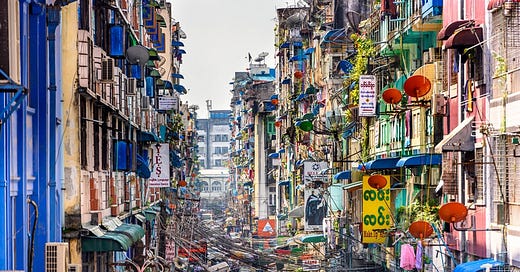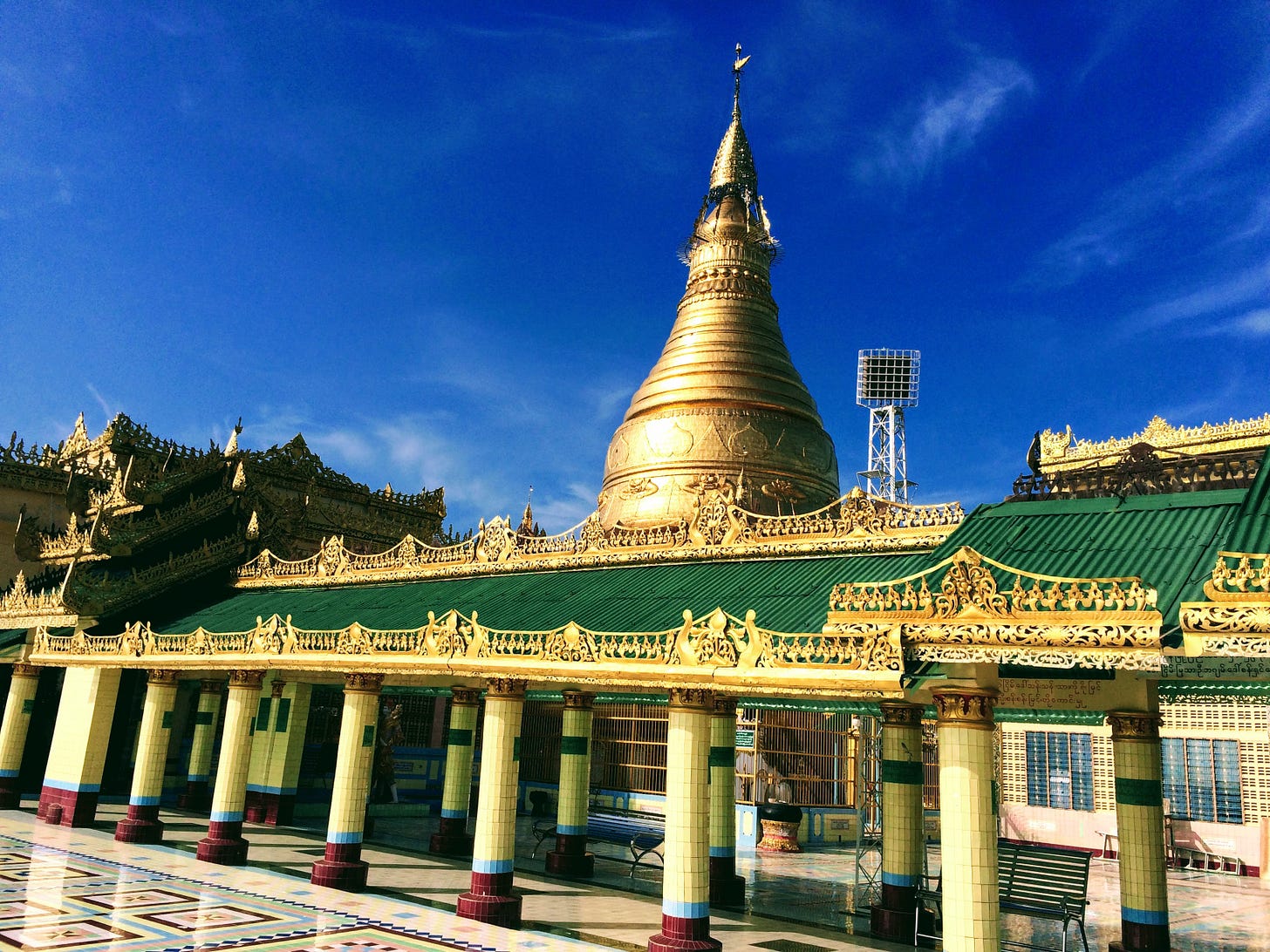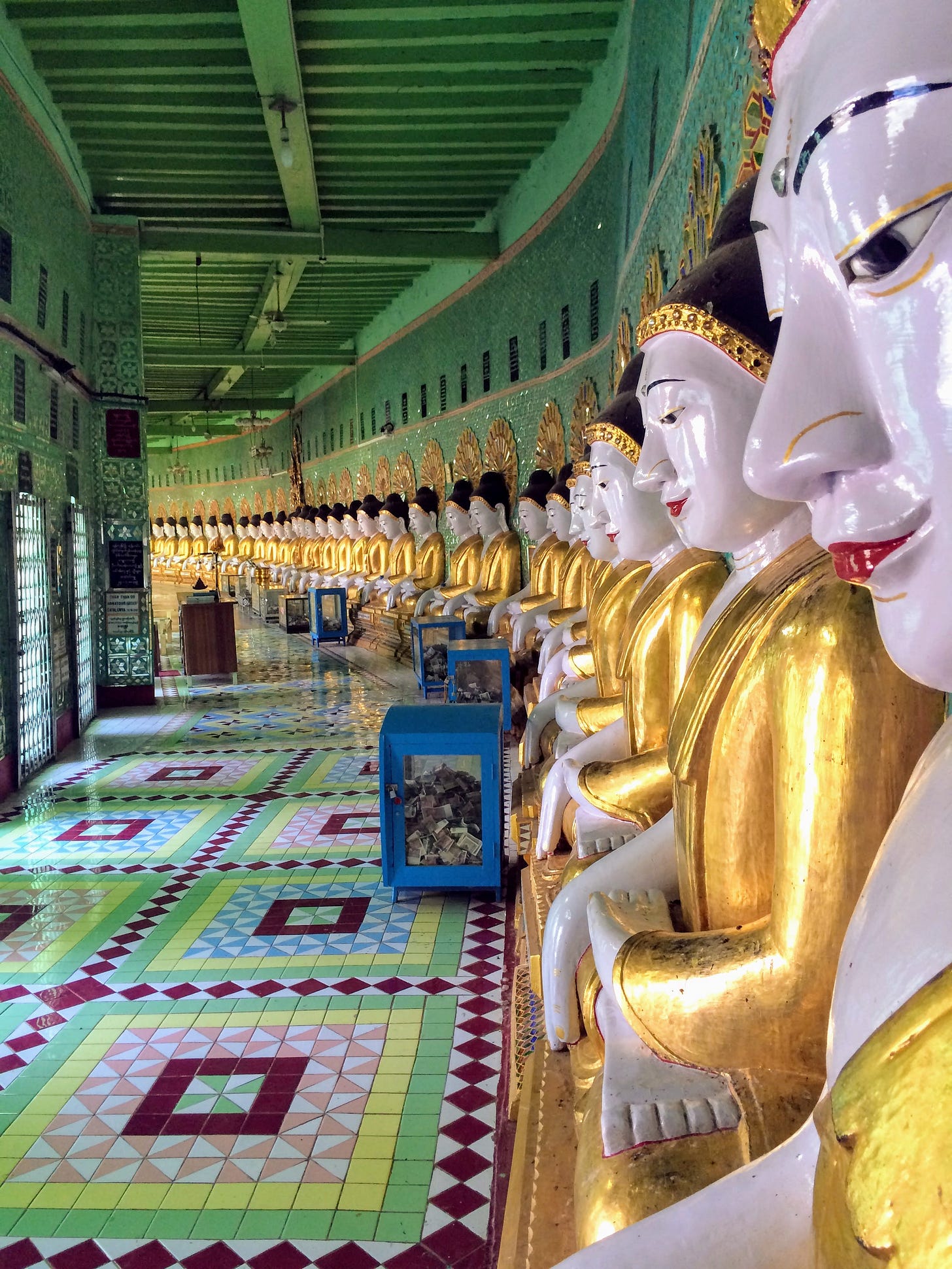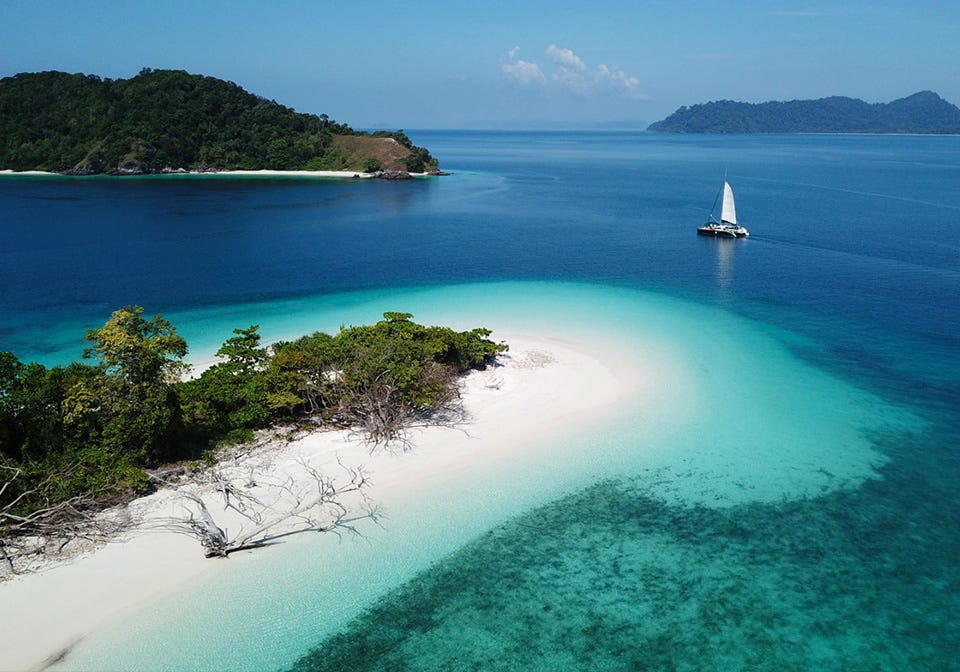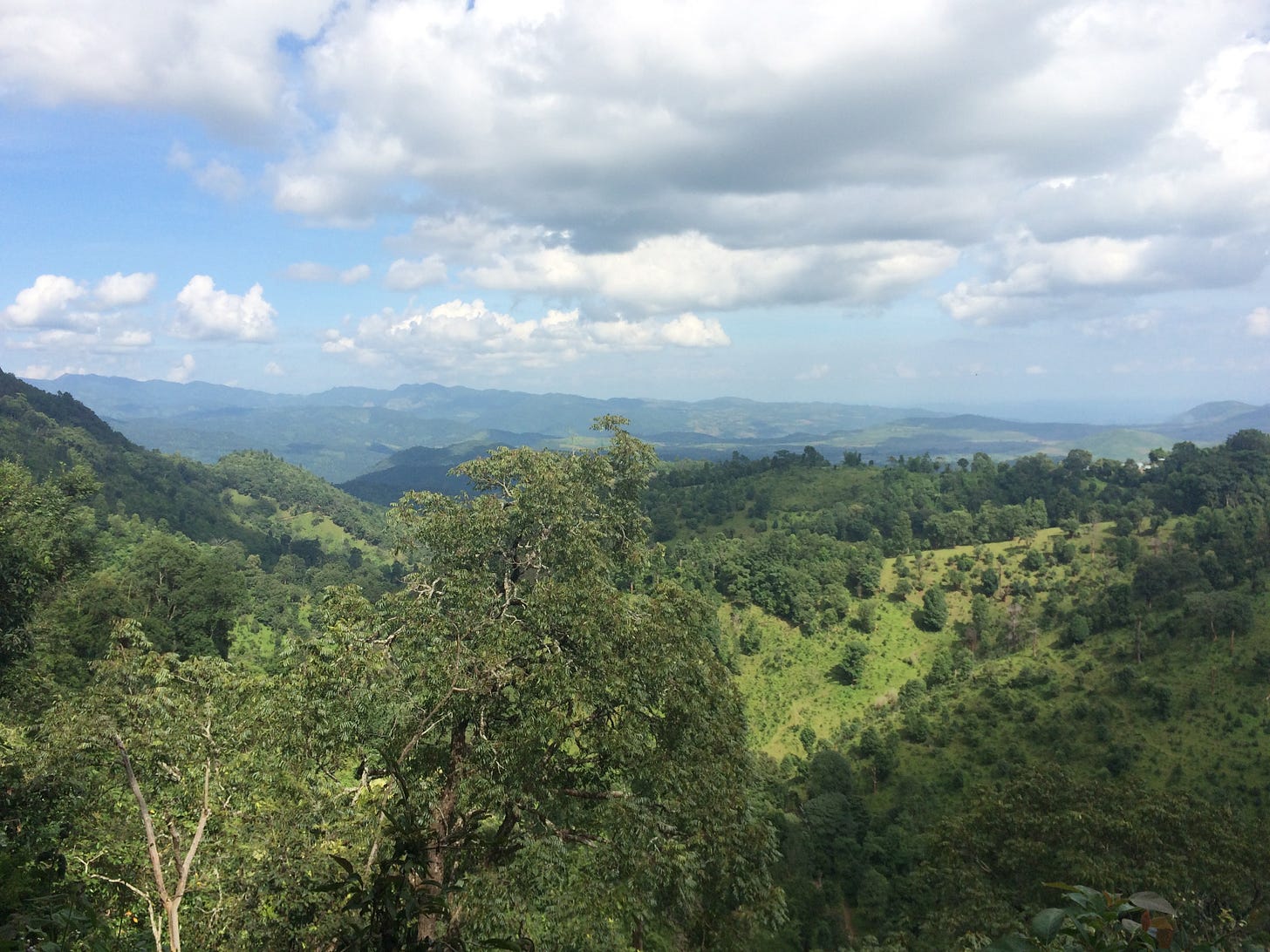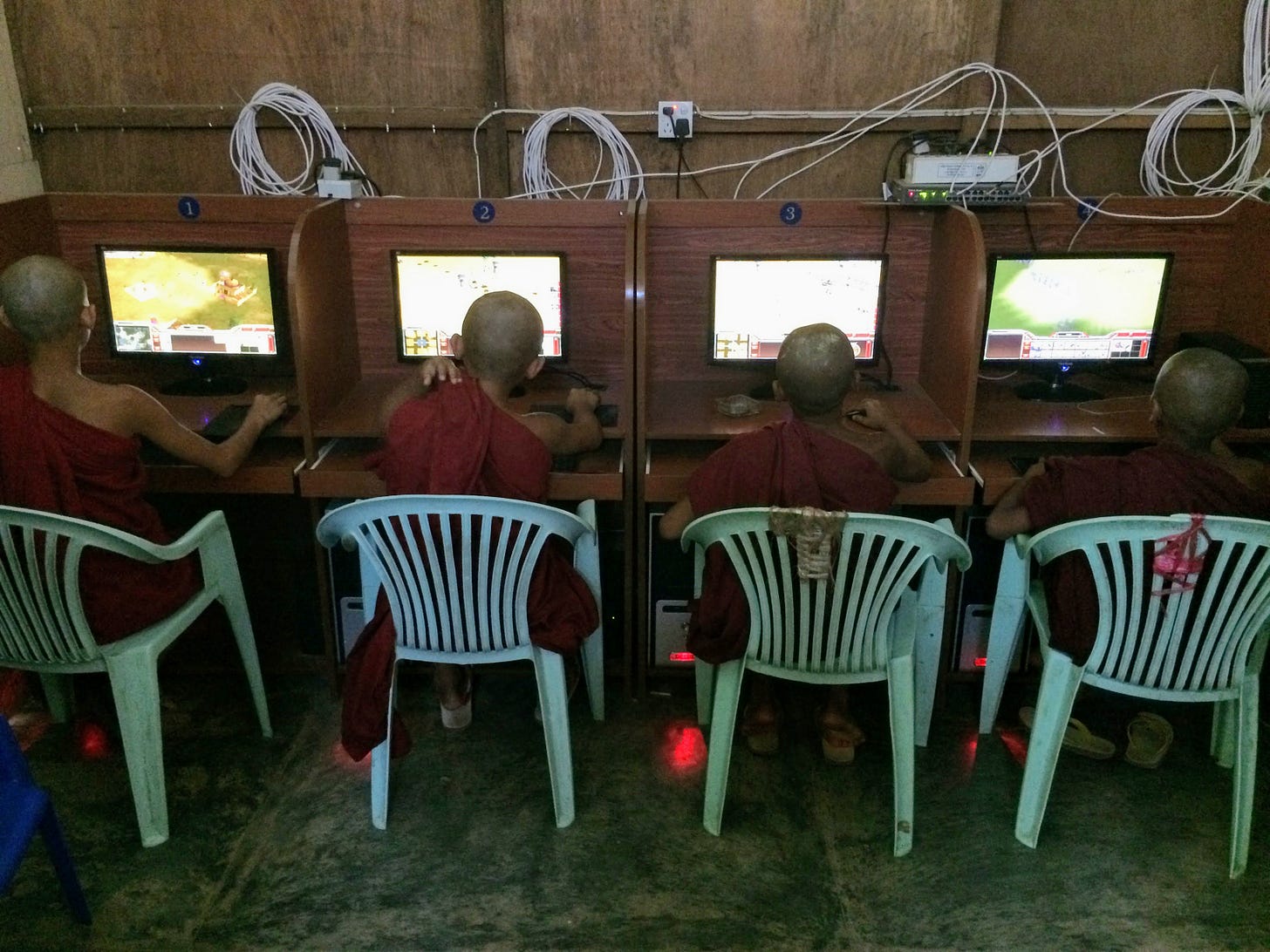Burmese days
Myanmar, or Burma as so many still dub the country, is trying to have its moment in the fulvous sun.
Sometimes travel is just complicated.
With another change of power, and some very helpful international attention, Myanmar is finding itself somewhere new – and perhaps, totally reborn. The country’s hope is again riding on its lauded hero and freedom fighter, Aung San Suu Kyi, recipient of the 1991 Nobel Peace Prize - and the latest is that the military (who’s in power right now) are ready to negotiate with her once more. But, muddying the waters even more, in July this year, four democracy activists have been executed by Myanmar's military in what is believed to be the first use of capital punishment in decades.
So let’s say this hope is precarious to say the very least.
Here is my podcast episode about my trek in Burma.
Perhaps the no-longer-State-Counsellor (Prime Minister really) San Suu Kyi is now caught in a wild crossfire, and the facts aren’t crystal. Perhaps the world should be giving her the benefit of the doubt, but then again power does all kinds of crazy things to people, right? Could she have done more? Almost certainly, it's not really imaginable that she couldn't. But how much of this “genocide” (as the United Nations dubbed it) was/is out of her hands and control? And you could argue that her hard lines assisted in the country falling back into a form of military rule…That would be a question mark on your travel plans to Burma for the moment, yes sure. But hey, I was an adventurer and it was five years ago…
It was 19 year old Eric Arthur Blair (pre-pen name George Orwell) who, in the 1920s, ventured to the furthest reaches of the British Empire - including Burma, where he spent five years and joined the Imperial Police Force. His first novel, Burmese Days, was set in the north of the country - detailing the British ruling with corruption and imperial bigotry as intrigue.
But Orwell was always destined to end up in Myanmar - as a child his obsession was with the work of Rudyard Kipling (I mean, who didn’t love The Jungle Book) who described this “faraway” land in great detail in his poems. Today these poems seem too pro imperialism-colonialism for my fancy. So much less interesting to me. Speaking of which, as for the country's name in case you were pondering, in 1989 the country decided to replace the English name "Burma" with "Myanmar" (the official name of the country in the Burmese language).
Myanmar, at this very time, is a complicated and partly dark place, as was South Africa when Mandela came to power, for instance.
But, there is always hope. And Myanmar has sort of erected a symbol of change. But this adjustment here has not come without a cost to too many lives, and to the heavily adjusted expectations of the improvements needed for a growing economy. And then there is the persecution of the Rohingya people in Myanmar who have been forced to flee to Bangladesh.
Pausing to think about whether your political views should dictate your holiday plans - well, here’s your prompt: How does the LGBTQ community feel going to a country, like Brunei, where they are punishable by death? And what about someone of a certain race or religion, who no longer feels welcome in America, think about coming here?
I mean, some travel agents and aid workers are raising issues of safety and are also noting that tourism dollars will only benefit the ruling military. Some other challenges tourists will face right now include a lack of access to cash, following the buckling of the banking system, and power blackouts…so ok fine, not the moment to go.
Bordering the brawny China, India and Thailand it has taken Myanmar an extensive time to start flexing their muscles. With over 135 ethnic groups the Republic of the Union of Myanmar has been a place of turmoil in the last few decades with its military rule, blocked bank sanctions from the U.S., and a serious halt on almost all tourism. But also on the economic sphere, Myanmar sold itself short to the neighboring markets and is now fired up to take back the reins – from manufacturing of machinery and equipment, to (hopefully very soon) intelligent tourism.
Now, with the country finally making its debut (again), tourism is steadily increasing by as much as 18% according to the Ministry of Tourism already pre-pandemic. I mean, what tourists are looking for are authentic experiences where they can connect and share with locals and Myanmar offers exactly that – receptive and unspoiled from the heritage sites in the cities of Yangon and Mandalay, to the forests and hills in the north of the country and right down to the white beaches that remain empty for miles and miles. And then the thousands of Buddhas dotting the countryside, some laying down in a respite, others in prayer…and some ogling your every move.
But, as expected, all of this is on some shaky ground, even more so as the U.S. State Dept. issued their red travel advisory.
But there are lots of things to marvel at, nevertheless. The low cost airline industry has taken hold, with six new airlines starting in the last few years, and brand new phone networks and semi-solid Internet connections aiding all this growth. For the first time cellphones are available for ordinary citizens to purchase whereas previously it was reserved for commercial use only – the endless posters from telecommunications are strewn all over the capital from the airport right into the inner city. Amazingly I arrived when the country was going “online” for the first time, locals showing me their Facebook as an absolutely novel and fascinating new phenomenon with much excitement.
“Sim cards used to be thousands of dollars, only the very rich could afford them and rent them out. Now finally this connection for people is cheap,” says Kyaw Soe Win, a tour guide from Mandalay. Qatar based Ooredoo, four years ago became the first foreign telecommunications company to provide services – potentially covering 85% of the 60 million+ people across the country. And with this simple world connection streaming, albeit slowly, on little screens right across one of the poorest nations in Asia, the country is finally asking bigger questions about freedom of speech.
“Tourism is changing really fast now as my country is showing great improvements finally,” says Soe Win who is from a small village in the mountains outside of the second largest city and previous capital, Mandalay. “I would go past the airport and envy people traveling, so I decided to do a training course in Yangon, and so I became a guide,” says Soe Win. With beautiful Buddhist temples intact and hundreds of solid gold pagodas scattered across the country, the cultural richness invites tourists with inexpensive prices from food, to lodging, to all that marvelous culture.
My shoes plod down on the earth and my connection with the country feels solid and respectful as I nod my head in respect to the landscape. Let’s call this a meditation expedition, effectively a hike, delivers an uphill almost instantly.
My Western mind and behavior of plenty of questions is quickly replaced by his suggestion of silence. It’s 90-something degrees, and the sweat runs off my face, into my eyes, and eventually drips into my socks. The sun, and the way it touches my skin, becomes a mindful sensation opposed to the usual annoying caress, and the smell of aromatic vegetation overwhelms me.
Trekking around Kyaukme, in the north east of the country, growth is most evident. Although there are hardly any tourists, the dirt-floored cafes are filled with locals reading the regional newspapers and slowly watching YouTube videos on their brand new smartphones. Around the café, sweet milky teas and htoe mont ( a ‘snack that is prodded’) are passed along with these brand new phones - sharing their new connections with the world. Outside men spit their rouge betel juice (Kwun-ya) into the dusty streets, as they have been for ages. And hundreds of brand new bikes shine as they speed through the little village. All of these obvious sign of growth plus some exciting new blood.
“The people from rural areas are nicer than the others from the cities. They are honest, friendly and away from greed. That's why they are so special,” says Moe Set, a local guide from Kyaukme. Set takes a small number of tourists into the wilderness near to the village that he was born in and encourages them to meditate whilst trekking. Which I did for a few days - needless to say I had to work very hard to get it even remotely half right…
Bath time is a short walk out of town where a bamboo pipe sticks out of the rocky mountain. The ladies are friendly as they wash their colourful clothes and small kids smile while playing and slipping around the water. There was a moment of shyness as they see me coming. This is soon washed away, as I too strip down to my underwear and run around splashing in the water. Our humanness and joy of life is just the same.
My bed, inside a local’s home, is a soft sheepskin that is laid on the floor. With no bedrooms, just one open communal room, we all line up next to each other with the cattle on the ground below and a thin wooden roof separating us from the stars above. A fire, used for the cooking, is nearby and dinner is served hot off the coals.
Before becoming a guide, Set, like so many Burmese boys, was a monk and received his free education and English language skills at a Buddhist Center in the forest. It is fascinating that Myanmar’s people remain religious in a most charming and engaging way. Their temples are cozy, each one almost like a little neighborhood unto itself. Buddhists go to their temples not only to worship, but also for afternoon naps and casual gatherings.
“The way of life for Myanmar people is hard. They have to struggle each day to survive. But it doesn't make them to give up everything. They can find contentment with their life,” says Set. In the villages, five hours walk from the nearest town; life is simple for its inhabitants; mornings start at 4.00 am when cattle are released, and the smells of open fire cooking start their wafts from inside their wooden homes. “What people find most amazing and unique here is the spirit of hospitality,” says Set. Locals cook their national dish “Lahpet” - a mixture of pickled tea leaves, roasted nuts, green chilies, dried shrimp, beetle larva with vegetables and topped off with plenty of fresh lime - and the custom is to share it with anyone that comes to visit in their homes. And I was there for it…
One of the government plans, according to Soe Win, is to open up restricted areas and allow selective tourism to venture in. With the world hungry for new destinations and explorers wanting to find the new frontier, it is Myanmar that holds just the right golden key. With the correct attitude towards tourism, a high quality approach, and not allowing for a destruction of all the beauty Myanmar might just be the next paradise. Let’s see what the very near future holds – one smartphone at a time.
Since traveling to Myanmar is tricky right now - here is some reading (besides for Orwell and Kipling) that will have to suffice, for the moment:
The Trouser People: Burma in the shadows of Empire by Pulitzer price-winning journalist Andrew Marshall.
Letters From Burma by Aung San Suu Kyi
The Glass Palace by Amitav Ghosh
Saving fish from drowning by Amy Tan
One of my favorite moments - perhaps in all of my travel life - was this magical snapshot where these young monks were having a sort of LAN party at a local Internet cafe in rural Myanmar…and passing around and around and around, a small plate of mont kywe the, a rice flour cake sweetened with jaggery and garnished with grated coconut…

